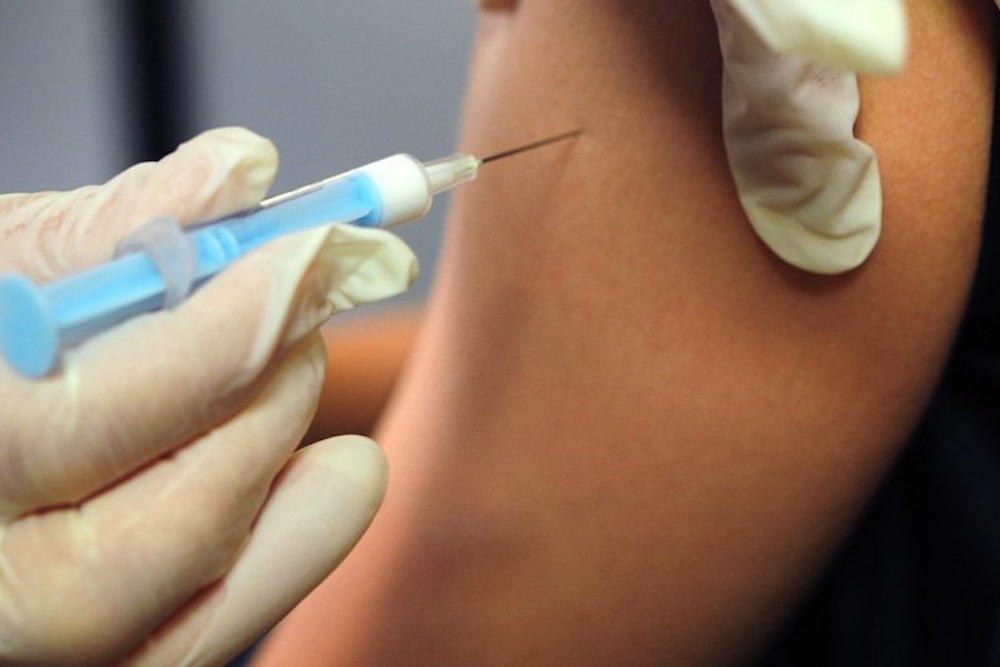Of all the sequestration pink slips about to be handed down from Washington, the one for programs to vaccinate children seems particularly shortsighted. Sure, there are several other candidates for worst idea ever, from education cuts to defense cuts. But with childhood vaccinations, we have not only the emotional tug (our darling babies!) but also financial reality: Vaccines are one of the most cost-effective preventative strategies in health care, saving billions of dollars a year.
Indeed, federal support of the vaccination of children may be the best example of well-spent federal dollars. Because any time vaccination is stopped—for religious or ideological or personal reasons—disease reappears. In the last decade, the U.S. and Europe have seen the return of pertussis (whooping cough), mumps, and measles due to incomplete vaccination, while Africa and Asia continue to battle outbreaks of polio. The famous Swine flu pandemic of 2009 infected about 60 million Americans and demonstrated the startling reach of a dangerous disease without an effective vaccination. And yet, with the sequester set to shave $2.4 billion off public health initiatives, there will be 840,000 fewer vaccinations—shots not given to infants and children (and a few adults) to prevent infections, all cheap to prevent and expensive to treat.
Plus, there is a very important point about infectious disease prevention that needs particular attention in these discussions. Infectious diseases, unlike heart failure or diabetes are, well, infectious. So sending sick people off to the emergency room—the theoretical healthcare safety net touted so enthusiastically by conservatives—is the exact wrong move. Where infections are concerned, the ER is anything but a safety net; rather, it's a hothouse of transmission, ground zero in the spread and amplification of infections. Indeed, almost all measles outbreaks investigated by the CDC over the last decade in the U.S. have started in a healthcare setting. Think about who is there: the sick and coughing next to the poor and under-vaccinated; the illegal immigrant and the alternative-med true believer next to the very young who fell off a table and the very old who fell on the floor—all of them susceptible to whatever new bug comes walking through the door.
Furthermore, the ERs hit by infectious disease outbreaks will struggle to run at capacity. Patients with other conditions will be seen more slowly by a reduced staff; hospital rooms upstairs will be filled with infectious patients, backing up people into the ER and lengthening already unacceptable waiting times. A little bit of misery for everyone.
So yes, we surely must make noise about the threats to public health any perturbation in the vaccination programs might make. Fortunately, we'll have some time: If all vaccination ceased tomorrow, we wouldn't see much in the way of disease for a few weeks, maybe even a month or two. After all, we are a pretty well-vaccinated population and herd immunity—if everyone else in my classroom has been vaccinated, I can probably get away without a vaccine—will protect the unvaccinated for a while. Of course once it settles in, be it measles or chicken pox or whooping cough, it will be every bit as devastating as advertised. But, unlike the Medicare patient whose surgery may be delayed or, more likely, the healthcare worker let go because of a sequestered funding shortfall, the kids will not be tossed off the fiscal cliff so fast.
Still, we have reached the point when children's health is just another talking point. But politicians beware: Unlike governmental deadlines, which have a way of being delayed into the distant horizon (this is how we ended up with the sequestration in the first place), infectious diseases mean business. They are around us, alive in the world, spreading a little or a lot, waiting for the moment when collective societal stupidity or cheapness or plain meanness weakens the protective shell of immunity cast over us by generations of sensible public health policy centered on vaccination. And surely if the parties dig in long enough and fiercely enough, if they become too fond of their breathless appearances on the evening news and the Sunday morning sit-around, then outbreaks of several different preventable diseases will make last 2009 pandemic influenza seem mild.
Kent Sepkowitz is an infectious-disease specialist in New York City. He has contributed to The New York Times, Slate, and The Daily Beast.
